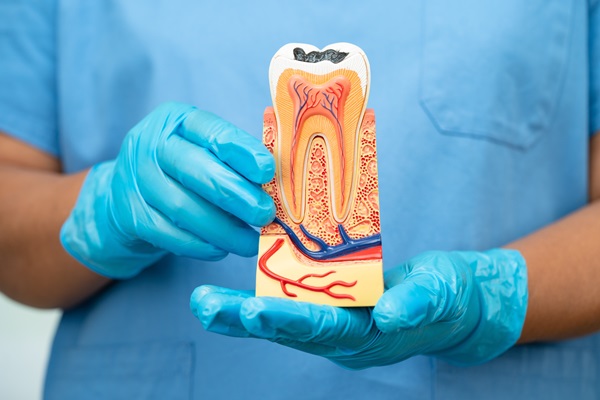Three Signs You May Need a Root Canal

A person may need a root canal to clean out the inside of their tooth and remove infection. However, not all infections present symptoms, and if they do, different people may experience them differently. For this reason, understanding whether you need a root canal can become tricky.
While no two people are entirely alike, most will experience roughly the same signs that their tooth is in trouble. If a root canal is necessary, the indicators may be pain, discoloration, or problems with the gums. Still, these issues can arise from other causes, so always visit a dental professional for evaluation. The longer you leave the issue, the worse it may get — and the more difficult it will be to resolve later.
When a root canal is necessary
The root canal process entails the dentist creating an opening in a tooth (usually on the back surface) to access the pulp chamber, the central location inside the tooth where the blood vessels and nerves are located. The dentist then removes these living tissues in order to treat infections that have infiltrated this vulnerable area.
After the blood vessels and nerves are removed from the center of the tooth, it is hollow on the inside, which can make it weak and brittle. To preserve the tooth and keep it strong, the dentist will insert a material called gutta percha into the hollow space before closing the hole with a filling and capping the structure with an artificial crown. Then, the tooth can remain functional.
A root canal is a last resort treatment that seeks to preserve a tooth rather than losing it to decay or removing it. Indicators that a patient may need a root canal include the following.
When tooth pain is severe
If infection spreads to the central chamber of a tooth, it can directly affect the nerves. Alongside increasing pressure buildup from bacterial waste and inflammation, this can lead to significant pain. Many people report that in the days leading up to their root canal, they were unable to sleep and could not focus on anything because the pain was so substantial and distracting.
Over-the-counter pain relief is not especially effective against discomfort caused by this type of infection. Thus, many people correlate intense and unrelenting tooth pain with the need for a root canal. However, some do not experience such intensity and may instead notice consistent sensitivity, especially to cold and hot foods and drinks.
When the tooth changes color
Blood flow to a tooth is part of what keeps it healthy and contributes to its color. When the blood vessels and nerves inside the tooth start to die, either due to infection or trauma, this change can gradually become visible on the outside surface.
If a tooth starts to turn brown or gray, this is a convincing sign that a root canal may be necessary. The tooth may also react to the decay by calcifying, which can cause it to have a yellow tint. If a patient’s tooth is not the color that they remember or if it does not match the teeth around it, they should have it checked by a dentist.
When the gums are sore or abscessed
The blood vessels that supply the pulp chamber of a tooth are routed through the gums. If infection can gain a foothold inside the tooth, it may travel outward, following the path forged by the blood vessels into other parts of the mouth. This can be dangerous for the person’s health, as the infection can travel anywhere in the body, including the heart. However, most commonly, it will start to cause problems with the gum tissue. Patients who are experiencing unexplained soreness or small, pimple-like bumps on their gums should be evaluated right away.
Is getting a root canal painful?
Many people have heard that getting a root canal is painful. The reality is that it is common for patients to experience profound relief immediately after the procedure is complete because it addresses the cause of their (usually significant) pain and discomfort. Root canals are performed by numbing the nearby nerves first, so a patient should not be in any discomfort throughout the process.
Get root canal treatment as soon as possible
If you suspect that you may need a root canal, visit a dentist as soon as possible. Every day that the infection is allowed to grow, the symptoms can become more severe, and the likelihood of being able to save the tooth decreases. Contact our office to schedule an appointment.
Request an appointment here: https://drdavidbrumbaugh.com or call R. David Brumbaugh, DDS at (214) 306-4402 for an appointment in our Dallas office.
Check out what others are saying about our dental services on Yelp: Root Canal Treatment in Dallas, TX.
Related Posts
Dental problems can happen at any time and often require immediate help to relieve pain and avoid potential complications. If you have urgent dental concerns, you might look for an emergency dentist or a same day dentist. Knowing the difference between these dental professionals can help you choose the best option for your needs.An emergency…
Medical hospitals are often unequipped to handle dental emergencies; this is when an emergency dentist becomes necessary. Recognizing the signs of a dental emergency is important for patients to get the help they need right away. Once patients know they are dealing with a dental emergency, they can look up “emergency dentist near me” instead…
Pain or discomfort in your mouth might call for an emergency dentist. Emergency dentists often treat cracked or broken teeth, knocked-out teeth, and severe mouth pain. Some swollen jaws are considered dental emergencies as well. Read on to learn what constitutes a swollen jaw emergency and how emergency dentists can help.If the swelling in your…
An emergency dentistry office is accustomed to repairing trauma to teeth. This is one of the most frequent types of reasons why patients go. If you have had an accident and hurt one or more teeth, call an emergency dentist near you. Though you may be in pain and have risks for further problems, you…


